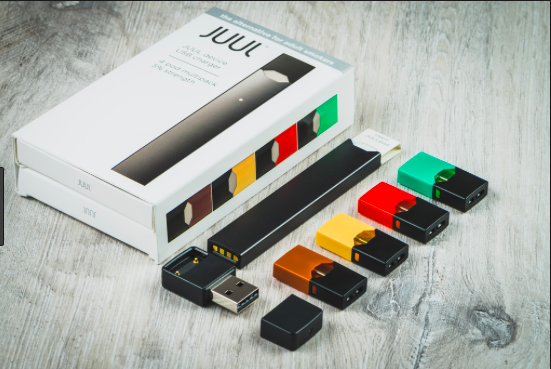
The latest campaign-finance numbers are in, and they include some surprises – and some information that should surprise nobody.
Juul Labs has spent $11.5 million to pass Prop. C, the measure that would overturn the city’s ban on vaping.

There’s another $1.2 million in unpaid bills that Juul will put up the money to pay. And Election Day is still more than an month away.
The money has gone for TV ads, literature, phone banking – and political consultants. Whitehurst Mosher Campaign Strategy and Media, a firm run by John Whitehurst and Mark Mosher, took in more than $2.1 million from Juul.
Not all of that cash goes right to the principals – some of it is spent on campaign materials. But Mosher, who is running the Yes on C effort, is doing very well this fall with the tobacco money.
The 11.5 million (so far) is a record for a single private company spending money on a San Francisco ballot initiative. The second-place campaign? An effort by R.J. Reynolds, also a tobacco company, to overturn the city’s ban on flavored vaping products in 2018.
Some of the Yes on C ads and talking points, Sup. Shamann Walton argues, are in violation of federal law. In a Sept. 17 letter to the Food and Drug Administration, Walton says that Juul’s operatives are making statements about the safety of the vaping devices and their efficacy in smoking cessation that have not been approved by the federal regulators. He cites a video of Juul consultant Tom Hsieh Jr. appearing at the Eastern Neighborhoods Democratic Club:
The “Yes on Proposition C” campaign proponent appearing in the video is Mr. Tom Hsieh, a paid consultant to Juul through Hsieh and Associates, according to Juul’s campaign finance statements … Juul’s paid consultant represented that vapor products are “a legitimate off-ramp for people who are addicted to cigarettes.”
[From Hsieh]: So, I want to separate some of the fiction and help give you some facts. I’m hoping by the end of this short presentation you’ll see vaping products in a whole new light. This is the truth about vaping products. There’s a lot of misinformation out there about it. The bottom line is it’s a legitimate off-ramp for people who are addicted to cigarettes.
Juul’s consultant then drew parallels to harm-reduction policies in the realm of public health, for which San Francisco has been a long-recognized national leader. His statements made health-related claims about cigarettes that unequivocally characterize e-cigarettes as “less harmful.”
[Hsieh]: “People are switching from something that has carcinogenics [sic], the tar, the formaldehyde and everything that’s related to a burning cigarette, and switching to a vaporize product that is less harmful.”
These are modified exposure and modified risk claims that can only be made after the FDA has issued an order specifically authorizing them. To the best of our knowledge, Juul has not yet submitted an application to make such modified risk and modified exposure claims, much less been granted permission to make such statements by the FDA.
The Yes on C campaign is now having to face the reality that hundreds of people have been hospitalized from the use of vaping devices, nobody knows exactly why, and California health officials are urging everyone to stop vaping immediately until there’s better information.
Help us save local journalism!
Every tax-deductible donation helps us grow to cover the issues that mean the most to our community. Become a 48 Hills Hero and support the only daily progressive news source in the Bay Area.
But win or lose, the consultants who take Juul’s money will do just fine.
In District Five, both candidates have raised a lot of money, and both are up against the spending cap of $250,000. Sup. Vallie Brown, the incumbent, has already spent $231,000 in 2019 and $16,000 in 2018, which puts her right up against the limit. That means she can’t spend any more money this all. Dean Preston, her challenger, has spent $203,000, along with $28,000 in 2018.
Most observers expect that the Brown campaign will benefit from a large independent-expenditure effort, but so far that hasn’t happened. The IE supporting her has only $10,000 in it.
Here’s what’s not surprising: According to my analysis, of the $61,000 Brown raised in the most recent period, from July 1 to Sept. 21, more than a third (about $22,000) came from either real-estate or development interests. Most of those contributions were at the maximum $500 level.
Preston, a career tenant lawyer and activist, has almost zero money from the real-estate industry.
The race for the District Attorney’s Office shows some fascinating numbers.
Chesa Boudin, a public defender running on a platform of criminal justice reform, has raised $500,000, significantly more than Suzy Loftus, who has the support of the mayor and the mainstream Democratic Party establishment and has raised $320,000 this year, but with her 2018 money has just over $500,000.
That’s a sign that Boudin’s effort has attracted both local and national attention. There’s also an Independent Expenditure committee for Boudin, affiliated with the SF Rising Action Fund, that has raised $86,000, mostly from criminal-justice reformers.
Leif Dautch, a deputy attorney general, has raised much less – only $137,000 to date – but he has a big independent-expenditure effort backing his campaign.
Ethics Commission filings show that the SF Deputy Sheriff’s Association PAC has spent $93,000 promoting the Dautch campaign. The Peace Officers Research Association of California, a statewide cop lobby, put $10,000 into the PAC. The Santa Clara County Correctional Peace Officers Association (prison guards) put up another $5,000.
And $15,000 went to this group, which by law has to operate entirely independent of the Leif Dautch campaign, from David Peterson, a retired TV executive who lives in Marin County. He’s also Dautch’s father-in-law.

